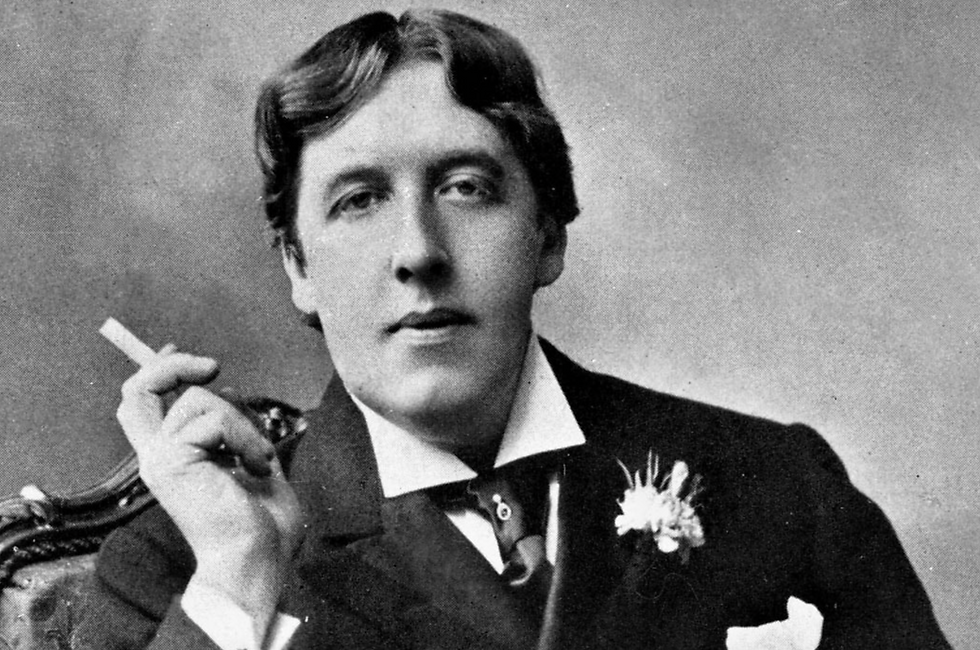Poet and playwright Oscar Wilde’s North Norfolk holiday hideaway
- Norfolk Notes
- Oct 20, 2021
- 4 min read

A North Norfolk Georgian farmhouse was, for a short while, the home of Irish playwright and poet Oscar Wilde.
Grove Farmhouse in Felbrigg, six miles from Holt, was where the flamboyant and controversial Wilde set up his temporary home with his wife, Constance, and later, his lover Lord Alfred 'Bosie' Douglas after being advised by his doctor to 'take in the pure air' of the countryside.
He chose Norfolk as his destination after being influenced by friends such as 19th century poet and theatre critic Clement Scott – the man who coined the term ’Poppyland’ to refer to North Norfolk. Scott was instrumental in the ‘discovery’ of North Norfolk as a holiday destination as the railways made it more accessible.
It was in Cromer's Hotel de Paris overlooking the sea and pier, and a brick and flint farmhouse in Felbrigg that Wilde worked on his play A Woman of No Importance in 1892.

The four-bedroom house has no blue plaque marking its significance in literary history unlike other properties associated with Wilde’s birth in Dublin in 1854 or the London property in Tite Street, Chelsea, which he shared with his wife in 1885 following their marriage the previous year.
Few Oscar Wilde enthusiasts are aware of the significance of the Norfolk farmhouse where the playwright escaped for solitude. His two-month stay followed the runaway success of his first comic masterpiece Lady Windermere’ Fan which launched at the St James’ Theatre, London, in 1892. It was his first success.
Oscar Wilde and his wife were joining the new craze of holidaying in North Norfolk following the arrival of new railway links to Cromer from London and the north of England. And he used the opportunity following the success of Lady Windermere’s Fan to get some time and space away from London so he could work on his new play.
His two sons were convalescing from whooping cough in Hunstanton while Wilde and his wife stayed in Felbrigg 40 miles away in their six-bedroom farmhouse with a bowling green and tennis courts. One of the characters in his new play, A Woman of No Importance, is Lady Hunstanton, named after the Norfolk town where his sons were recovering from illness.
The tiny village of Felbrigg is dominated by Felbrigg Hall and its 520 acre estate of rolling parkland and woods and a lake. The hall, now owned by the National Trust, dates back to Tudor times. The 14th century church, a quarter of a mile away, is where Norwich School painter John Sell Cotman was married in 1809.
Oscar Wilde’s wife Constance returned to London after a month in Norfolk and Lord Alfred, known as Bosie, the third son of the Marquis of Queensberry, joined Wilde for a ten-day stay at the farmhouse. The two men had met a year earlier and soon became lovers.
They were inseparable until Wilde was arrested four years later, convicted of gross indecency and sentenced to two years hard labour from 1895 to 1897.
It was Lord Alfred’s father, the inventor of the Queensberry rules in boxing, who could not accept his son’s relationship with Wilde. He goaded Wilde about his sexuality and his written insult, penned on his visiting card and left at Wilde’s London club, led to Oscar Wilde’s downfall. Wilde sued Lord Queensberry for libel and lost. A criminal prosecution followed and Wilde was convicted and jailed for gross indecency after a series of trials.

Norfolk writer, broadcaster, actor and comedian Stephen Fry is an Oscar Wilde fan. He played the lead character in the acclaimed 1997 British biographical film ‘Wilde’.
Fry is a member of the Oscar Wilde Society, a non-profit making society founded in 1990 and devoted to the appreciation of Oscar Wilde. It aims to promote knowledge, appreciation and the study of Wilde’s life, personality, and works.
Stephen Fry, who lives in mid-Norfolk is an honorary patron of the society.
Oscar Wilde published his first collection of poetry in 1881. He wrote The Happy Prince and Other Tales, The House of Pomegranates, and in 1890 The Picture of Dorian Gray.
After his first success with Lady Windermere’s Fan he went on to write A Woman of No Importance – which it is believed he completed while in Norfolk. This play, which satirises upper-class society, had its premiere at the Haymarket Theatre, London, in April 1893. Wilde then wrote An Ideal Husband and The Importance of Being Earnest. All his writing, plays and prose, were acclaimed and Wilde soon became the darling of Victorian society.
Only a few years later he was a social outcast. He was a broken man and bankrupt when released from jail. His wife had changed her name and taken their two sons to live in Switzerland. They never divorced.
On his release, he left immediately for France, and never returned to Ireland or Britain. There he wrote his last work, The Ballad of Reading Gaol (1898), a long poem commemorating the harsh rhythms of Victorian prison life. He spent his remaining years in exile wandering around Europe and staying with friends or in cheap hotels.
The Anglo-Irish writer, once the toast of London, became a pariah. He died in 1900 on November 30th from meningitis aged 46.
Comments